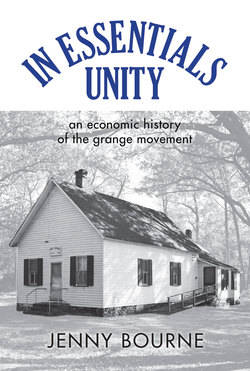Читать книгу In Essentials, Unity - Jenny Bourne - Страница 14
На сайте Литреса книга снята с продажи.
Оглавление2
The Granger Railroad Laws
We adopt it as our fixed purpose to “open out the channels in nature’s great arteries, that the life-blood of commerce may flow freely. . . .” We are not enemies to capital, but we oppose the tyranny of monopolies.
—Declaration of Purposes of the Patrons of Husbandry
For some, familiarity with the Grange comes from awareness of postbellum laws concerning railroads. Yet the so-called “Granger legislation” and related court cases had little to do with direct Grange influence on the political and legal processes.1 Still, if only by virtue of the nomenclature, a discussion of these laws belongs in any book about the Grange. Contemporaneous newspapers and commentators linked the Granger laws with the Grange. And the connection to the Patrons of Husbandry is strong, if not direct. The laws arose in states that had significant Grange membership. What is more, they dealt with transportation and grain storage issues and raised questions about the nature of public goods, both of which deeply concerned early Grangers.
The Granger cases are fascinating from a broader historical perspective as well, because they exhibit the first major invocation of the due process clause of the recently adopted Fourteenth Amendment. More typically associated with lawsuits involving civil rights, the Fourteenth Amendment formed the foundation of the argument made by corporations in the Granger cases.
The holdings in the Granger cases—issued mere months before the great railroad strike of 1877—mark a turning point in American law, because they held that the newly ratified Fourteenth Amendment did not interfere with the right of the states to regulate private enterprises that were “clothed with” a public interest. In essence, these cases blessed the new Granger statutes. Some view the outcome in these cases as preventing industrial enterprises from exploiting ordinary citizens, whereas others see it as a fundamental encroachment on private property rights.2 Despite their significance in legal history, however, the Granger laws were short-lived and did little to affect railroad rates, returns, or construction patterns in the late nineteenth century.
Common Carriers: Are They a Public Good?
To economists, a pure public good is one that is nonexclusive and nonrival in consumption. In other words, no one is prevented from using the good, and my “consumption” of it does not affect your “consumption” of it. Few goods are purely public or purely private in nature but instead fall somewhere in between. A piece of cake is a private good (if I eat it, you can’t); a streetlight is closer to being a public good (I can’t prevent your benefiting from it, and my use of it does not fundamentally impair your use of it).3 Complicating the concept of a “public” good is the fact that the public sector spends money on things that may not be pure public goods. Professional sports stadiums constitute one controversial example today. Many cities and states have chosen to use public funds or borrowing capability to finance these, although most economists consider them essentially private goods.4
